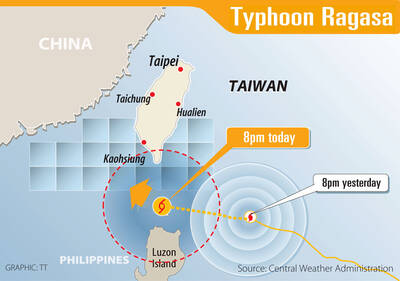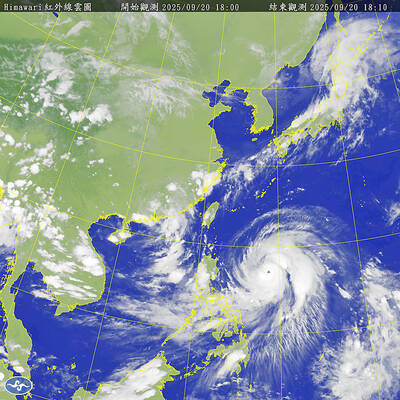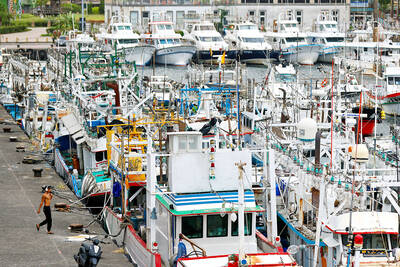The nation’s three operating nuclear power plants will soon run out of space to store nuclear waste, the Ministry of Audit said yesterday.
Construction of a new nuclear waste storage facility is behind schedule and a site for the storage of low-level radioactive waste has not even been confirmed, the ministry said. The ministry said it noticed the problem while examining government spending last year.
The two storage facilities that collect nuclear waste from units one and two at the Jinshan Nuclear Power Plant in Shihmen Township (石門), New Taipei City (新北市), have reached 89.85 percent and 85.50 percent of their capacity respectively, the ministry said.
The storage facility for waste from the second unit at the Guosheng Nuclear Power Plant in New Taipei City’s Wanli Township (萬里) has exceeded 70 percent of its capacity, the agency said, adding that storage facility for waste from the second unit at the Ma-anshan Nuclear Power Plant in Ma-anshan (馬鞍山), Pingtung County, has nearly reached 50 percent capacity.
Spent fuel dry storage facilities are still only in the planning stage and construction is not scheduled to start until April 2015 at the earliest, the ministry said.
The ministry said the storage capacity for waste at the first plant was close to its limit and that the situation could threaten the plant’s continued operation.
The Ministry of Economic Affairs (MOEA) said in March that Wuciou island (烏坵), Kinmen County, and Daren Township (達仁), Taitung County, were possible sites for storage facilities for low-level radioactive waste.
However, the MOEA has since ruled out the possibility of building a facility in Wuciou -because of -various factors, including -ecological and environmental reasons, while the Taitung County Government has been asked list part of Daren as a cultural preservation area to preserve the heritage of the Paiwan tribe.
The Ministry of Audit said the MOEA should look for a new site in order not to delay the construction of the facilities even further.
The auditing authority also found that the budget for the yet-to-be-completed Fourth Nuclear Power Plant in Gongliao District (貢寮), New Taipei City, has increased from NT$169.73 billion (US$5.88 billion) to NT$273.65 billion.

One of two tropical depressions that formed off Taiwan yesterday morning could turn into a moderate typhoon by the weekend, the Central Weather Administration (CWA) said yesterday. Tropical Depression No. 21 formed at 8am about 1,850km off the southeast coast, CWA forecaster Lee Meng-hsuan (李孟軒) said. The weather system is expected to move northwest as it builds momentum, possibly intensifying this weekend into a typhoon, which would be called Mitag, Lee said. The radius of the storm is expected to reach almost 200km, she said. It is forecast to approach the southeast of Taiwan on Monday next week and pass through the Bashi Channel

WARNING: People in coastal areas need to beware of heavy swells and strong winds, and those in mountainous areas should brace for heavy rain, the CWA said The Central Weather Administration (CWA) yesterday issued sea and land warnings for Typhoon Ragasa, forecasting that it would continue to intensify and affect the nation the most today and tomorrow. People in Hualien and Taitung counties, and mountainous areas in Yilan and Pingtung counties, should brace for damage caused by extremely heavy rain brought by the typhoon’s outer rim, as it was upgraded to a super typhoon yesterday morning, the CWA said. As of 5:30pm yesterday, the storm’s center was about 630km southeast of Oluanpi (鵝鑾鼻), Taiwan’s southernmost tip, moving northwest at 21kph, and its maximum wind speed had reached

The Central Weather Administration (CWA) yesterday said that it expected to issue a sea warning for Typhoon Ragasa this morning and a land warning at night as it approached Taiwan. Ragasa intensified from a tropical storm into a typhoon at 8am yesterday, the CWA said, adding that at 2pm, it was about 1,110km east-southeast of Oluanpi (鵝鑾鼻), Taiwan’s southernmost tip. The typhoon was moving northwest at 13kph, with sustained winds of up to 119kph and gusts reaching 155kph, the CWA Web site showed. Forecaster Liu Pei-teng (劉沛滕) said that Ragasa was projected to strengthen as it neared the Bashi Channel, with its 200km

PUBLIC ANNOUNCEMENTS: Hualien and Taitung counties declared today a typhoon day, while schools and offices in parts of Kaohsiung and Pingtung counties are also to close Typhoon Ragasa was forecast to hit its peak strength and come closest to Taiwan from yesterday afternoon through today, the Central Weather Administration (CWA) said. Taiwan proper could be out of the typhoon’s radius by midday and the sea warning might be lifted tonight, it added. CWA senior weather specialist Wu Wan-hua (伍婉華) said that Ragasa’s radius had reached the Hengchun Peninsula by 11am yesterday and was expected to hit Taitung County and Kaohsiung by yesterday evening. Ragasa was forecast to move to Taiwan’s southern offshore areas last night and to its southwestern offshore areas early today, she added. As of 8pm last night,